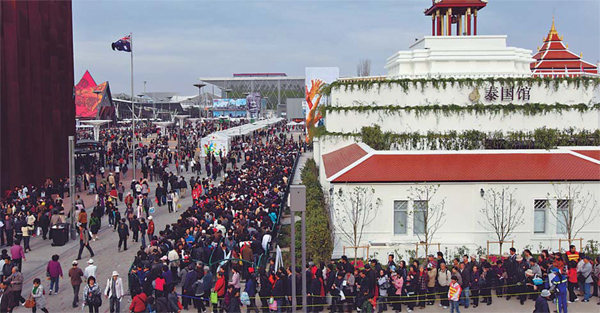

|
 |
|
Visitors queue in line outside the Thai Pavilion inside the Expo Garden during its soft opening on April 25. GAO ERQIANG / CHINA DAILY |
Problems ironed out during trial period as the Expo opens its gates for the real thing
Visitors, officials and pavilion organizers all learned some valuable lessons following last week's trial run for Expo 2010 Shanghai.
Visitors realized they had better bring a good book next time they queue up outside pavilions such as the USA, UK, Japan or Australia, which saw waiting times of between two and four hours. They also learned to arm themselves with packed lunches as word spread of the long lines and high prices of eateries inside the Expo Garden.
Spanish officials twigged that permanent security teams and metal fences were crucial, as did their Thai counterparts. The Thais also decided that having a belated water-throwing party later this summer outside their front gates to celebrate Thai New Year was probably not such a good idea.
| |||
Songkran, a riotous mid-April festival, sees people armed with high-powered water guns and buckets of water creating good-natured havoc on the streets of Bangkok, other major cities, towns and villages throughout the Kingdom.
As 1.1 million people crowded into the Expo Garden's 3.28 square kilometers over six days until last Monday, the biggest challenge was marshalling the crowds and maintaining order. This all fell into place after an emergency meeting was convened last Saturday night in response to earlier complaints about the long lines and difficulty making reservations for the China Pavilion.
However peace had taken root by Sunday morning as security teams policed the crowds - which lined up for hundreds of meters outside pavilions - more closely. The frantic pace of earlier days of the trial period gave way to a more Disneyland-like atmosphere, as public speakers pumped out tunes and families consulted maps.
Many visitors also got to interact with young people from around the world, who were able to demonstrate, in fluent Mandarin, that the perceived chasm between their respective cultures was not so difficult to bridge.
"The Chinese absolutely loved our student ambassadors, because they are young and full of energy," said Martin Alintuck, chief spokesman for the USA Pavilion.
"So we worked on refining their training and listening to their experiences on how to improve things."
The USA Pavilion, the second-most anticipated national pavilion after China's "Oriental Crown", hired 168 Mandarin-speaking students to help break down cultural barriers. Organizers also struck a chord by having Kobe Bryant on a big screen inside the pavilion showing that even US sports superstars are brave enough to attempt a sentence or two in Chinese - and laugh at their own mistakes.
"I think there was some disappointment that people weren't going to get to see the whole program, because we only opened our first act," said Alintuck. "But the Chinese were very well behaved. Even on the first day, I know some of the other pavilions had problems, but we didn't have any major issues. So we were very happy about that.
"We also realized that the more information we can share with the people waiting in line, the better," he said, adding that 35,000 visitors can spend 45 minutes inside the pavilion daily. This is about two-thirds the number that will be permitted inside the China Pavilion.
Spain, which is becoming a little concerned about the work involved in rotating its regional exhibits every day, was overwhelmed by the masses that gravitated towards its giant wicker basket-shaped exterior.
"We knew we were going to be popular, but we didn't expect such big crowds," said Maria Tema, Spain's Expo commissioner general. "The most useful thing we learned was that our pavilion is going to be a big, big success."
Tema requested permanent security teams after discovering that having a new security team every day created as many problems as it solved.
"It's better if they know each other and how to work together," she said. "We want everything to be peaceful and calm. The only change we proposed for the queues is that we don't want to be a nuisance for our colleagues at the other pavilions, so we asked that they be arranged in a different way."
Some pavilions realized that demand for their mascots and merchandise is likely to shoot through the roof.
"Everybody has been asking 'where can we buy Tai'?" said Kanda Vajrabhaya, commissioner general of the Thai Pavilion, referring to her country's cute and green, alien-looking mascot. "He's very popular," she added.
"It was a great idea for the Expo organizers to prepare the soft opening," said another member of her team, Kreingkrai Kanjanapokin. "Otherwise the overcrowding would have forced us to close our pavilion after May 1, when people had already paid for their Expo tickets and were expecting to see every pavilion."
The trial period also gave the Expo's army of nervous volunteers six days to practice handling thousands of questions and complaints. Meanwhile, Chinese employees got to brush up on their knowledge of countries and regions they have never visited, but are expected, for the next six months, to be experts on.
"For me, personally, it gave me a chance to know more about Africa," said Joyce Lung, assistant planner for events team Touch Africa at the Africa Joint Pavilion. "I knew a little before, but now I'm more familiar with African culture.
"It actually got me very interested in traveling there. I think after the Expo ends I'll fly there and start my journey from South Africa."
China Daily
(China Daily 05/01/2010 page26)
